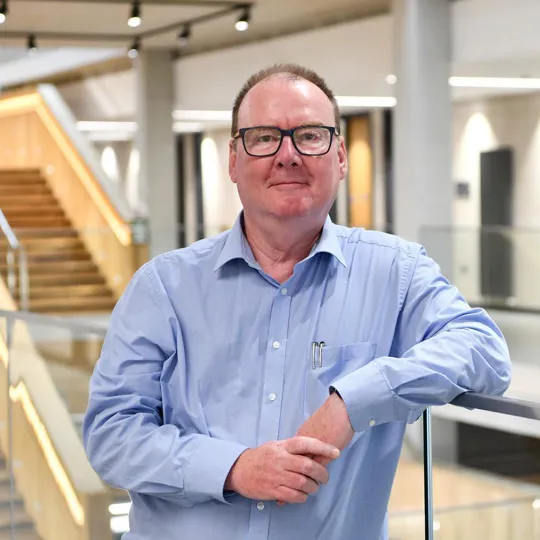Why choose this apprenticeship?
- INDUSTRY-ALIGNED SUSTAINABILITY FOCUS – Aligned with the West Midlands’ 2041 net zero target, the programme develops expertise in renewable energy systems and tools like BREEAM, LEED, and EPC, supporting UN SDGs 7, 9, 11, and 13, and preparing apprentices to lead sustainability initiatives in construction and engineering sectors.
- INTEGRATED WORK-BASEDLEARNING – Combining academic study with workplace training, the programme ensures apprentices apply knowledge in real projects, developing practical skills for roles such as Building Services Engineer or Sustainability Consultant, and enhancing career readiness through continuous professional development and employer engagement.
- ADVANCED DIGITAL PROFICENCY – Apprentices gain mastery of BIM, IES, CFD, and IoT/AI technologies, including cybersecurity for Building Management Systems, preparing them to drive the construction industry’s digital transformation through intelligent, data-driven, and sustainable building design and management solutions.
- CIBSE ACCREDITATION PATHWAY – The programme incorporates a 20-credit CIBSE End-Point Assessment within a 40-credit Major Design Project, supporting progression toward CIBSE accreditation and professional engineer status, enhancing employability and recognition in the building services engineering sector.
- SPECIALIST FACILITIES – Access to advanced labs featuring IESVE, CFD, and BIM software provides practical experience in environmental simulation, design optimisation, and performance analysis, ensuring technical competence aligned with current and emerging industry standards.
- EXPERT TUITION AND DIVERSE ASSESSMENTS – Delivered by industry-experienced faculty, the programme blends lectures, seminars, and practical sessions. Assessments—50% coursework, 33% exams, 17% presentations—develop critical thinking, teamwork, and communication skills essential for technical and professional success.
Our facilities
-
IESVE (Integrated Environmental Systems Virtual Environment): model energy performance, airflow, and thermal comfort in buildings.
-
Computational Fluid Dynamics (CFD): analyse ventilation and cooling strategies, such as atriums and stacks, for real building designs.
-
BIM and Revit: apply digital collaboration tools for facilities management, cost estimating, and clash detection.
-
Controls and Building Management Systems (BMS): explore smart building technologies and automation.
-
Matlab and project management tools: develop analytical skills and apply frameworks such as PRINCE2.
-
Dedicated IT labs: access industry-standard software and complete hands-on assessments through practical presentations and simulations.
Course breakdown
- Core Modules
Year 1
Further Mathematics for Construction
This module advances your mathematical knowledge from Level 4, specifically for use in the building services engineering industries. It teaches you to analyse and model building services engineering situations using advanced mathematical techniques. Topics covered include complex numbers, matrix theory (for solving linear equations), numerical methods, and expanding calculus knowledge to model and solve problems using first and second order differential equations.
Construction Maintenance Management
This module enables you to effectively design and implement repair and maintenance strategies for the built environment estate. It develops knowledge of the role of maintenance/facilities management from a strategic perspective, including the scope of facilities management and the benefits of asset management programmes. Key areas include evaluating construction materials and their deterioration mechanisms, and studying the legal standing of dilapidation reports, statutory controls, and assessing the costs of repairs.
Renewable Energy
This module develops knowledge of renewable options that system designers utilise in construction and the built environment. Students explore renewable energy systems globally for both domestic and non-domestic buildings. The main learning outcome is the ability to design and calculate a renewable energy system for a non-domestic building, comparing options suitable for the UK, such as photovoltaic, solar, wind, and hydro systems.
Thermofluids and Acoustics
The study of thermofluids is critical to the design, specification, and operation of building services engineering systems. Students explore thermofluids, heat transfer, thermodynamics, fluid mechanics, and combustion, focusing on their calculation and application. Students gain knowledge to work on heating and refrigeration systems. The module also covers acoustics, including the causes of noise and vibration, calculating noise levels, and developing strategies to manage the acoustic environment.
Controls and BMS
This module focuses on understanding Building Management Systems (BMS), common in commercial, public, and domestic properties. It explores how automatic control of heating, cooling, lighting, and security has become the norm, driven by the priority of energy efficiency. The content covers the influence of IoT devices (like NEST and Hive) and predicts how AI will make BMS more intelligent. A critical focus is placed on analysing how cyber security is becoming critical when related to controls, BMS, and the Internet of Things (IoT).
BIM / Revit (FM and Cost estimates)
This module provides students with an understanding of the detailed processes that support construction professionals within the context of Building Information Modelling (BIM). Students explore how BIM helps with costings and assists Facilities Managers (FM) in the day-to-day running and maintenance of assets in large commercial buildings. The knowledge gained focuses on how BIM enables better information management across the life of a building and allows students to determine its relevance when looking at costs and FM.
Year 2
Smart Buildings and IoT, AI
This module examines rapid developments in Artificial Intelligence (AI) and its relation to smart buildings, considering current industry applications. It explores Internet of Things (IoT) devices (non-standard computing hardware like sensors and actuators) and critically assesses their security in commercial and domestic settings. The module analyses how IoT and AI can make a building more energy efficient and environmentally friendly, addressing Sustainable Development Goal 11.
Sustainability in Construction
This module enables students to gain knowledge of environmental assessment methods used in the construction industry. It covers methods for individual elements and whole projects. Students explore a project’s environmental issues and how its impact can be reduced and mitigated. The content includes examining key tools for project sustainability, such as BREEAM, LEED, NABERS, and EPC, and comparing these methods.
Project Management for Building Services
This module provides an understanding of techniques and practices for effective project management of building services engineering. Students explore constraints on large, complex construction projects, focusing on time, cost, quality, and labour shortages. The module involves developing project plans, solutions to problems, and comparing project management tools, including PRINCE2.
Advanced BIM or IES and CFD
This module focuses on advanced computational analysis and modelling. It involves using specialised software for Integrated Environmental Solutions (IES) on real buildings and undertaking internal airflow and thermal studies using Computational Fluid Dynamics (CFD). Students analyse airflows, seasonal effects, produce a design for a specific office (e.g., a three-storey design), and demonstrate how elements like an atrium or stack can cool a building with models.
Major Design Project
This compulsory double module develops skills for lifelong professional development. The project assesses the student’s ability to apply knowledge and analytical skills gained throughout the degree to solve complex, interrelated building problems. The design proposal must address innovation, sustainability, contracts, health, welfare, and safety in a real-life scenario. Students produce quantitative and qualitative data and analyse how the design supports Sustainable Development Goals.
Key information
Entry requirements
Academic: Apprentices on this programme must have a minimum of a Level 2 in maths and English. We can guide you through your Level 2 functional skills in maths and English if you don't already possess them. An initial assessment will be completed as part of your enrolment.
Applicants must have successfully completed a Level 4 Higher Apprenticeship as a Senior Technician (HVAC) to be eligible for entry.
All apprentices must be employed full-time and their employer must be willing to support them through the apprenticeship.
How to apply
To apply you must already be employed, and your employer must agree to you completing this apprenticeship. Once this agreement is in place please contact apprenticeships@ucb.ac.uk who will guide you and your employer through the process.
Please do not apply directly to the university for this apprenticeship. If you have an enquiry, please reach out to our team.
Teaching and assessment
We use a wide range of assessment strategies to support all styles of learning including:
- written assignments
- practical observations and projects.
On completion of the apprenticeship, all learners will undertake an end-point assessment which is comprised of an observation, a test and an interview supported by a portfolio of work. The end-point assessment takes place with an independent organisation. On completion, they will advise you of your grade.
Our teaching and assessment is underpinned by our Learning and Teaching Strategy 2025-2030.
Fees
As an apprentice, you won’t need to pay tuition fees. Both your employer and the government will cover these costs for you. This extends to degree apprenticeships as well, allowing you to gain valuable work experience and academic qualifications without tuition expenses.
You may be eligible for the Learner Support Fund, which assists college students with course-related costs such as essential uniform, equipment and travel. For more information, please visit our Financial Support for College Students page.

With over 22 years in the industry and two decades in education, I’m passionate about developing the next generation of engineers who can lead the shift toward low-carbon, energy-efficient buildings. Building services underpin around 60% of new-build costs — from HVAC to renewables — and are vital to sustainable design. Through this apprenticeship, we’re equipping learners with the innovation and technical skills to meet the West Midlands’ 2041 net zero challenge.



